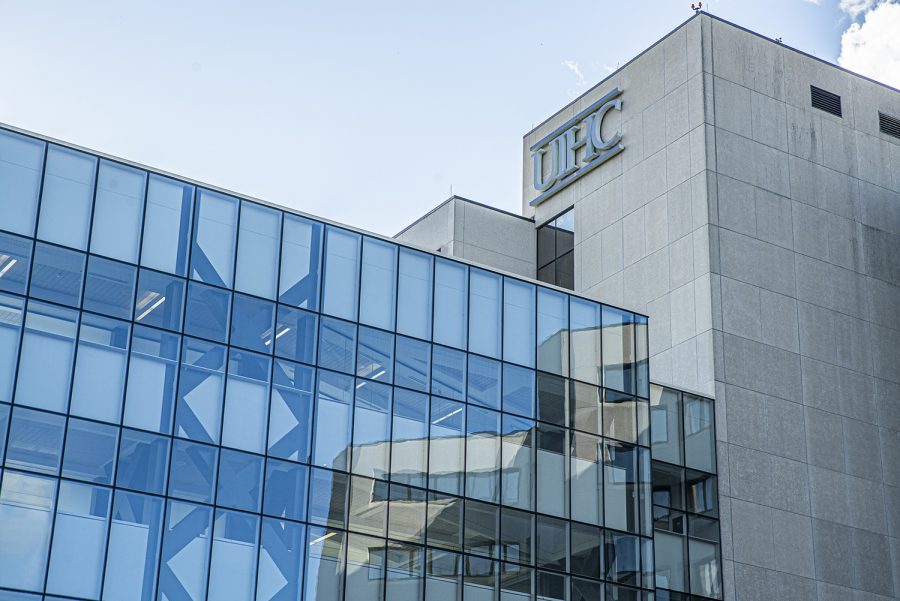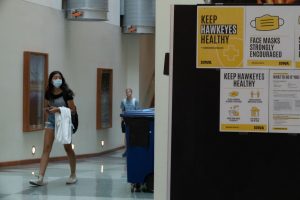UIHC experts push vaccination in face of rising delta variant rates
University of Iowa Hospitals and Clinics is experiencing a surge in COVID-19 patients as the delta variant drives up case rates.
University of Iowa Hospitals and Clinics are seen on Tuesday, June 23, 2020.
August 24, 2021
After previously experiencing a decline in cases, COVID-19 rates in Johnson County are surging, spurred by the highly contagious and transmissible delta variant.
In response to this surge, health care workers are calling on the public to get vaccinated, avoid crowds, and wear masks to decrease the amount of people in the intensive care unit.
As of Monday, there are 26 adults and five children with COVID-19 in the University of Iowa health care system, making the total number of patients who’ve received in-patient care 751 since Jan. 4, according to UIHC.
In recent weeks, Johnson County has shifted from a moderate to high level of transmission of COVID-19, according to the Centers for Disease Control and Prevention.
The delta variant poses more of a threat than other COVID-19 strains because of how quickly it multiplies, UIHC Chief Medical Officer Theresa Brennan said.
“The delta variant is more transmissible because it sticks to human cells more aggressively,” Brennan said. “It replicates or multiplies much more quickly than the original virus, so people can infect people with more copies of the virus.”
For people to protect themselves, Brennan said health experts are calling on people to return to healthy practices that people demonstrated early in the pandemic.
“Masking works against COVID-19 and other respiratory viruses. Avoiding crowds and maintaining distance is also really important,” Brennan said. “The biggest risk now is for people who aren’t vaccinated, but anybody can get it.”
As Iowans prepare for the flu and allergy seasons, people are experiencing more symptoms that are similar to COVID-19.
Brennan said it’s important for people to get tested as soon as they notice symptoms, even if they’re vaccinated.
“People who’ve gotten vaccinated think they are impenetrable, but we’ve seen breakthrough cases where people have been infected,” she said. “Everyone, including people who’ve been vaccinated, should be worried about COVID-19 symptoms.”
Nearly 95 percent of people who have COVID-19 in the hospital have the delta variant, said Kevin Doerschug, medical director for the Medical Intensive Care Unit.
RELATED: UIHC participates in various COVID-19 vaccine trials
UIHC uses monoclonal antibody infusions for the delta variant that the hospital has used for COVID-19 since the start of the pandemic, Brennan said.
“What we’ve been doing since the beginning is trying to prevent blood clots, monitoring patients and getting them hospitalized, and working with the home treatment team,” Brennan said.
In the Intensive Care Unit, health care professionals are using extracorporeal membrane oxygenation, known as ECMO, to help the lungs and heart that are injured because of COVID-19, Doerschug said.
The nation is experiencing a shortage of ECMO machines, forcing health care professionals to turn to other treatments, he said.
“We’re trying to come up with protocols and find out what other hospitals are doing to make educated changes in our treatment plans,” Doerschug said. “If we run out of this resource, we’re going to do everything we can to support our patients with non-ECMO functions — we could use the ventilator or turn it up.”
A critical part of treatment is steroids and other COVID-19 medications, Doerschug said.
“Giving people steroids is really important to reduce the inflammation in the lungs,” Doerschug said. “Another medicine we use is tocilizumab, but there’s a national shortage so no one is able to get that medicine in this country.”
Steroids help reduce inflammation in the lungs, which are targeted by COVID-19, Doerschug said.
RELATED: UI to maintain current COVID-19 guidance despite faculty petition
“Most of the injury that we see in the lungs is due to inflammation — it’s necessary to fight the infection but there’s a balance of what’s needed and what’s excess when fighting off the virus, Doerschug said. “The inflammation stays after the body gets rid of the virus, which is why steroids are helpful for reducing that in the lungs.”
As communities across the state see rising rates of transmission, UIHC is working with other hospitals to keep everyone in the state healthy, said Dan Diekema, UI professor of internal medicine and UIHC associate hospital epidemiologist.
“UIHC leadership meets and communicates regularly with local and state public health and with other hospitals in our state and region, as we have throughout the pandemic,” Diekema said. “We must keep a continuous eye on the capacity of the health care system so that we can anticipate needs for patient transfers.”
Because of the recent surge and the number of patients requiring critical care, Intensive Care Unit staff are exhausted and calling on the community to reduce COVID-19 numbers, Doerschug said.
“We’ve been doing this for 18 months now — people need breaks and society needs to help us,” Doerschug said. “We really want help from people outside of health care to do the right things — getting vaccinated and wearing masks — to protect other people and make this stop.”
Additionally, the low number of available ICU beds at UIHC continues to pose a threat for people seeking care, Doerschug said.
“Our ICU is full and we’re working hard to get everyone in,” Doerschug said. “So far, Iowa’s been OK, and we’ve managed to get people the help they need, but it’s taken a lot of effort to figure out where to put them — effort that could go into caring for those patients.”
Almost everyone getting admitted to the hospital with COVID-19 are unvaccinated, he said.
“Every day I’m seeing more COVID patients that are dying and didn’t get a vaccine. They’re not perfect, but it’s clear that the vaccines are effective — vaccinated people are not dying in the Intensive Care Unit,” Doerschug said. “Vaccines are saving lives and we just need more people to get them.”






